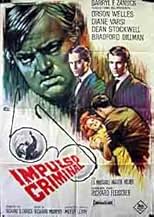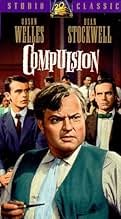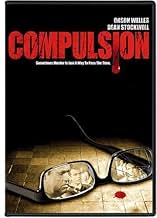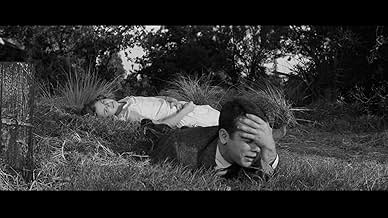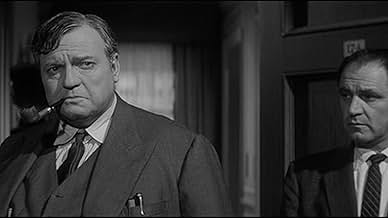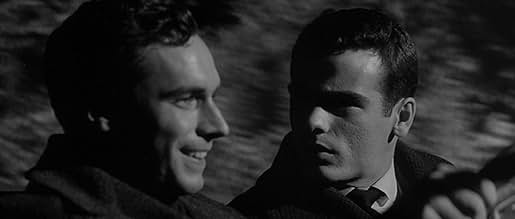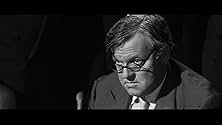NOTE IMDb
7,4/10
8,1 k
MA NOTE
Deux riches étudiants en droit sont jugés pour meurtre dans cette version de l'affaire Leopold-Loeb.Deux riches étudiants en droit sont jugés pour meurtre dans cette version de l'affaire Leopold-Loeb.Deux riches étudiants en droit sont jugés pour meurtre dans cette version de l'affaire Leopold-Loeb.
- Réalisation
- Scénario
- Casting principal
- Nomination aux 1 BAFTA Award
- 1 victoire et 5 nominations au total
Robert F. Simon
- Police Lt. Johnson
- (as Robert Simon)
John Alban
- Reporter
- (non crédité)
Don Anderson
- Reporter
- (non crédité)
Brandon Beach
- Courtroom Spectator
- (non crédité)
Terry Becker
- Benson - The Angry Reporter
- (non crédité)
Russ Bender
- Edgar Llewellyn - Attorney
- (non crédité)
Avis à la une
The real-life Leopold-Loeb murder case, which inspired Alfred Hitchcock's "Rope," among other films, is the basis for this story of a couple of rich young men committing a murder just for the thrill of trying to pull off the perfect crime. Stockwell and Dillman are well cast as the cold-blooded killers. The first half of the film, focusing on the strange relationship between the two men, their crime, and their arrest, is quite interesting. Then Welles shows up as the defense attorney and the film loses momentum. Welles seems to be sleep-walking through this one, and his final speech seems to take up about a third of the film.
I don't know why I'm so attracted to this vulnerable weirdos. From Anthony Perkins as Norman Bates in Psycho to Colin Firth as Adrian Leduc in Apartment Zero, darkness and a fragility that is part of the unbearable suspense. Maybe I'm in need of professional attention but I don't think so. What attracts me is by the undeniable innocence behind the horror and that has a lot, if not everything, to do with the actors playing them. Look at Anthony Perkins in Psycho! 57 years ago and it still looks and feels kind of revolutionary or Colin Firth in Apartment Zero, the character is so unique and real that you can see it a thousand times and always find some new extra something, then Dean Stockwell in Compulsion. He plays a monster, a sick, pathetic prince of a man. Yes all of that. The humanity of the actor makes the monster human and we can't dismiss him, he doesn't allow us. Orson Welles has a great entrance into the film and E.G Marshall is superb as per usual, it is the rest of the cast who seem a bit dated, specially when sharing the frame with the extraordinary Dean Stockwell
If "Compulsion" is still such a powerful film is, totally, Dean Stockwell's merit. What a sensational actor! I'm writing this the day after the announcement of Dennis Hopper's death and while I was looking for a Dennis Hopper movie to watch a came across "Compulsion" Not Hopper but Stockwell and I settled for that anyway. I was riveted by Stockwell's performance because everyone else (with the natural exception of Orson Wells and E G Marshall) seems so dated and acted that Dean's every moment is sheer magic. He doesn't shy away from the awfulness but makes his young monster totally human, provoking in us that element that Orson Welles's closing argument tries to bring to the forefront. If you love great acting, you can't afford to miss Dean Stockwell in "Compulsion"
"Compulsion" was one of the most important American films of the late 50s. Based loosely on the famous Leopold and Loeb case, the movie still packs quite an impact because of the excellent work by the three principals. As directed by Richard Fleischer, this is a disturbing look at two criminal minds who thought they were above and beyond the law because they had the perfect crime planned. The film was greatly adapted for the screen by Richard Murphy from the Meyer Levin book and stage play.
Even for those clever enough to carry on a murder, there is always a possibility that a minor mistake will give the culprit away. The two young men at the center of the story, Judd Steiner and Artie Straus are homosexual lovers. At the time, being gay in America must have been one of the worst things in a more puritanical and pious society. These two men hide their sexual preference well because of the circles they both move. Coming from upper class families, in a way, made it easier for these men to formulate a plan to satisfy their idle existences.
After committing a heinous crime, just because they thought they could get away with it, the two friends begin experiencing the guilt associated with what they have done. Judd's reaction is different from Artie's. Where Judd tries to lay low, Artie tries to help the police in a bold move that will end up badly. Judd suddenly feels abandoned by Artie when he realizes Artie might be getting too close to the people investigating the murder.
As careful as these men had been, something that apparently seems innocent, ties them to the crime. The principal investigator, Sid Brooks, turns the men against one another by playing his cards right. This is the moment that Jonathan Wilk, the famous trial lawyer enters the picture. Unfortunately, even a star lawyer can't save people that have talked too much because they thought they were above the law.
Star lawyers have always been at the center of all famous trials throughout the history. In a way, it's ironic that only one man, the great Jonathan Wilk is the only person in court to defend Steiner and Straus. Had it been today, these two men would have had a battery of expensive lawyers making the case for them. The figure of Wilke is based on the real lawyer of the Leopold and Loeb case: Clarence Darrow, a man larger than life.
Dean Stockwell and Bradford Dillman made an invaluable contribution to the success of the film. Mr. Stockwell, a child actor that grew up in front of the camera, makes a compelling Judd Steiner. Mr. Stockwell gets under Steiner's skin because he seems to know what made this young man do what he did. Mr. Dillman was a relative new face to the movies, but his performance as Artie Straus has a profound effect on the viewer. Neither man makes a likable person, but maybe that was the message the author of the play wanted to leave the viewer with.
Orson Welles made a splendid appearance as the defense lawyer, Jonathan Wilk. Mr. Welles' physical presence dominates most of the court proceedings. In fact, is a tribute to his genius that he towers over everything around him whenever he is in front of the camera. E. G. Marshall has some good moments as Sid Brooks, the investigator who unearths the truth in this case. Ed Binns, Martin Milner, Robert Simon, Richard Anderson make contributions to the film. Diane Varsi, as the Ruth Evans is the only female that has an opportunity in the film.
The film moves at a quick pace and will, no doubt, satisfy those viewers seeking intelligent entertainment.
Even for those clever enough to carry on a murder, there is always a possibility that a minor mistake will give the culprit away. The two young men at the center of the story, Judd Steiner and Artie Straus are homosexual lovers. At the time, being gay in America must have been one of the worst things in a more puritanical and pious society. These two men hide their sexual preference well because of the circles they both move. Coming from upper class families, in a way, made it easier for these men to formulate a plan to satisfy their idle existences.
After committing a heinous crime, just because they thought they could get away with it, the two friends begin experiencing the guilt associated with what they have done. Judd's reaction is different from Artie's. Where Judd tries to lay low, Artie tries to help the police in a bold move that will end up badly. Judd suddenly feels abandoned by Artie when he realizes Artie might be getting too close to the people investigating the murder.
As careful as these men had been, something that apparently seems innocent, ties them to the crime. The principal investigator, Sid Brooks, turns the men against one another by playing his cards right. This is the moment that Jonathan Wilk, the famous trial lawyer enters the picture. Unfortunately, even a star lawyer can't save people that have talked too much because they thought they were above the law.
Star lawyers have always been at the center of all famous trials throughout the history. In a way, it's ironic that only one man, the great Jonathan Wilk is the only person in court to defend Steiner and Straus. Had it been today, these two men would have had a battery of expensive lawyers making the case for them. The figure of Wilke is based on the real lawyer of the Leopold and Loeb case: Clarence Darrow, a man larger than life.
Dean Stockwell and Bradford Dillman made an invaluable contribution to the success of the film. Mr. Stockwell, a child actor that grew up in front of the camera, makes a compelling Judd Steiner. Mr. Stockwell gets under Steiner's skin because he seems to know what made this young man do what he did. Mr. Dillman was a relative new face to the movies, but his performance as Artie Straus has a profound effect on the viewer. Neither man makes a likable person, but maybe that was the message the author of the play wanted to leave the viewer with.
Orson Welles made a splendid appearance as the defense lawyer, Jonathan Wilk. Mr. Welles' physical presence dominates most of the court proceedings. In fact, is a tribute to his genius that he towers over everything around him whenever he is in front of the camera. E. G. Marshall has some good moments as Sid Brooks, the investigator who unearths the truth in this case. Ed Binns, Martin Milner, Robert Simon, Richard Anderson make contributions to the film. Diane Varsi, as the Ruth Evans is the only female that has an opportunity in the film.
The film moves at a quick pace and will, no doubt, satisfy those viewers seeking intelligent entertainment.
The film deal with two young men (Bradford Dillman , Dean Stockwell) who murder a pal . They are law students and followers to Nietsche theories . They are investigated by an astute prosecutor (E.G.Marshall) . He's growing suspicion but there isn't one perfect crime . As the relentless justice to be executed and they go on trial for killing . A famous lawyer (Orson Welles) will defend them on the accusation of murderers and under death penalty . A young girl (Diane Varsi) will testify for them .
This highly interesting film is inspired on real events about Nathan Leopold-Richard Lob killing case in Chicago of the 1920s . Although the story was obviously a thinly-disguised recreation of the known murder case , the legal department of 20th Century Fox was still concerned about a possible lawsuit from the still-living Leopold . In fact , a great effort was made not to mention Leopold or Loeb in the film , press releases , and interviews . The film contains suspense , drama , tension , illicit love with intertwining triangles , emotion , courtroom trial and complex intrigue maintained throughout . Besides , superb performances by main roles (Dillman , Stockell , Varsi, Welles) and supporting casting (Martin Milner , Robert F. Simon , Gavin McLeod , among others). Special mention for Orson Welles who displays a terrific acting and explaining a significant speech into criminal court . The movie is visually magnificent with an excellent black and white cinematography by William C. Mellor . Evocative and adjusted music by Lionel Newman . The motion picture was wonderfully directed by Richard Fleischer .
This is the second of four film adaptations of the Leopold-Loeb murder case , other versions about same events are the famous ¨The rope¨ (1948) by Hithcock with John Dall (in the character of Bradford Dillman )and Farley Granger (in the role of Dean Stockwell), ¨Swoon¨ and recently ¨Murder by numbers¨ by Barbet Schroeder with Michael Pitt and Ryan Gosling . Indispensable and fundamental seeing for court genre enthusiasts and Orson Welles fans . It's one of Richard Fleisher's best. Rating : Above average .
This highly interesting film is inspired on real events about Nathan Leopold-Richard Lob killing case in Chicago of the 1920s . Although the story was obviously a thinly-disguised recreation of the known murder case , the legal department of 20th Century Fox was still concerned about a possible lawsuit from the still-living Leopold . In fact , a great effort was made not to mention Leopold or Loeb in the film , press releases , and interviews . The film contains suspense , drama , tension , illicit love with intertwining triangles , emotion , courtroom trial and complex intrigue maintained throughout . Besides , superb performances by main roles (Dillman , Stockell , Varsi, Welles) and supporting casting (Martin Milner , Robert F. Simon , Gavin McLeod , among others). Special mention for Orson Welles who displays a terrific acting and explaining a significant speech into criminal court . The movie is visually magnificent with an excellent black and white cinematography by William C. Mellor . Evocative and adjusted music by Lionel Newman . The motion picture was wonderfully directed by Richard Fleischer .
This is the second of four film adaptations of the Leopold-Loeb murder case , other versions about same events are the famous ¨The rope¨ (1948) by Hithcock with John Dall (in the character of Bradford Dillman )and Farley Granger (in the role of Dean Stockwell), ¨Swoon¨ and recently ¨Murder by numbers¨ by Barbet Schroeder with Michael Pitt and Ryan Gosling . Indispensable and fundamental seeing for court genre enthusiasts and Orson Welles fans . It's one of Richard Fleisher's best. Rating : Above average .
Le saviez-vous
- AnecdotesAlthough the story was a thinly-disguised recreation of the Nathan Leopold and Richard Loeb murder case, the legal department of 20th Century Fox was still concerned about a possible lawsuit from the still-living Leopold. A great effort was made not to mention Leopold or Loeb in the movie, press releases, and interviews. However, there was apparently poor communication with the advertising department, since when the movie came out, newspaper ads stated, "based on the famous Leopold and Loeb murder case." Leopold sued the filmmakers. He did not claim libel, slander, nor anything false nor defamatory about the film. Instead, he claimed an invasion of privacy. The court rejected his claim, in part, because Leopold had already published his own autobiography "Life Plus 99 Years," presenting essentially the same facts.
- GaffesWhen the murdered boy is in the morgue, his uncle recognizes him instantly, and the coroner doesn't mention to the young journalist (who found the glasses) that the kid had acid burned all over his face so he couldn't be identified. In the real life case, his face was burned and, most importantly, at the very end of the movie, Orson Welles as the defending attorney mentions that the murdered boy's face was burned with acid.
- Citations
Jonathan Wilk: If there is any way of destroying hatred and all that goes with it, it's not through evil and hatred and cruelty, but through charity, love, understanding.
- Crédits fousOpening credits prologue: CHICAGO, 1924
- ConnexionsFeatured in The Paper Chase: Commitments (1983)
Meilleurs choix
Connectez-vous pour évaluer et suivre la liste de favoris afin de recevoir des recommandations personnalisées
Détails
- Durée1 heure 43 minutes
- Couleur
- Rapport de forme
- 2.35 : 1
Contribuer à cette page
Suggérer une modification ou ajouter du contenu manquant

Lacune principale
By what name was Le génie du mal (1959) officially released in India in English?
Répondre

